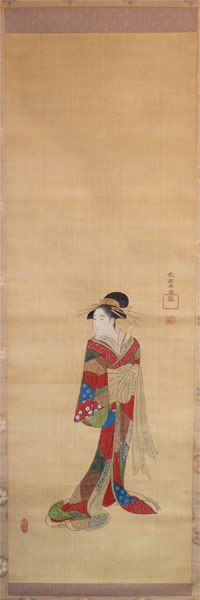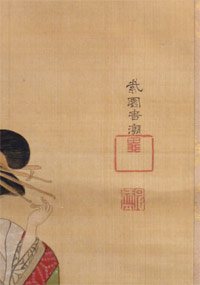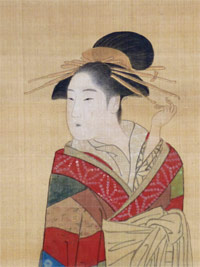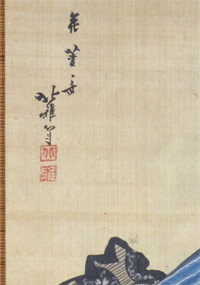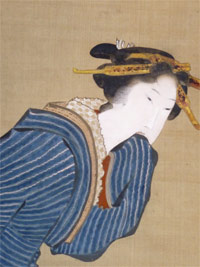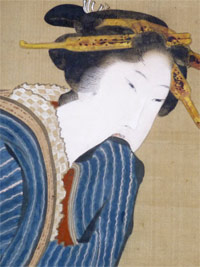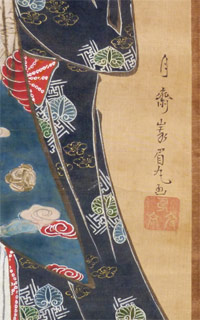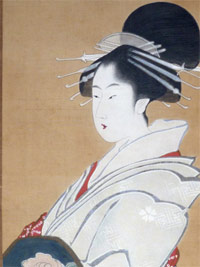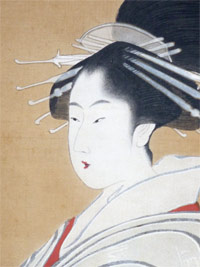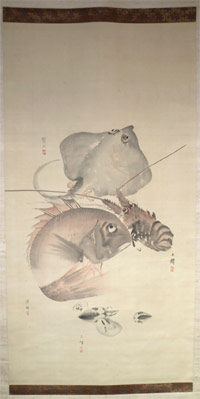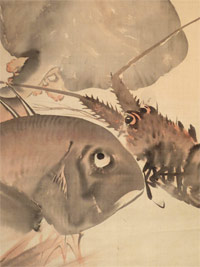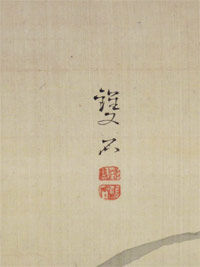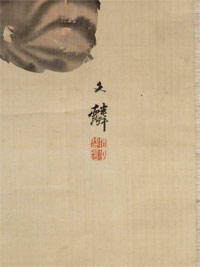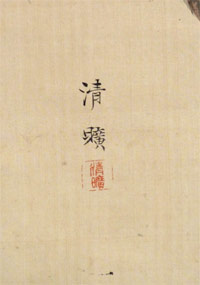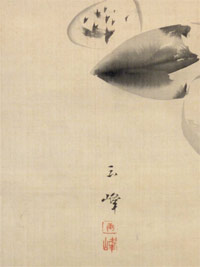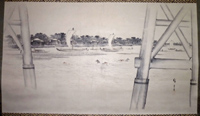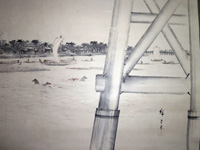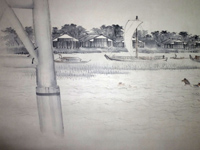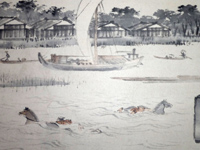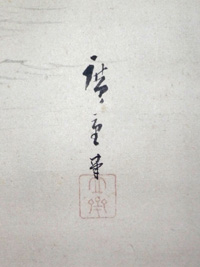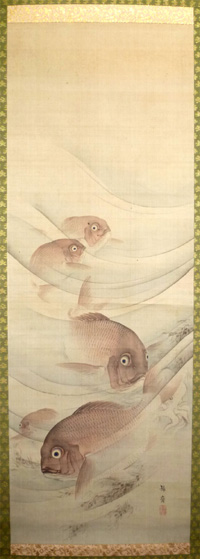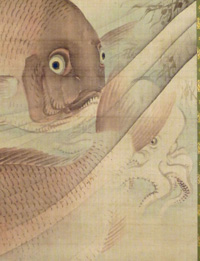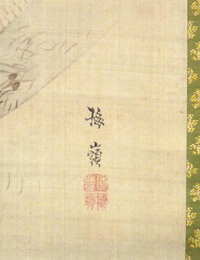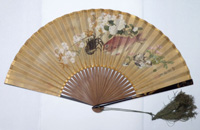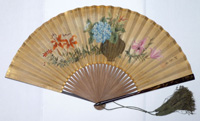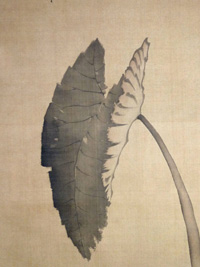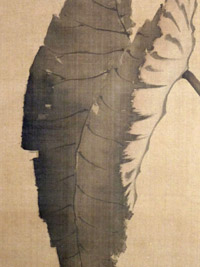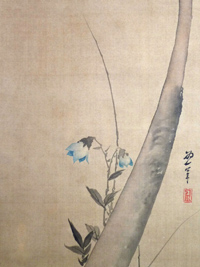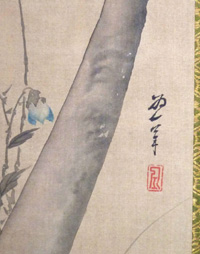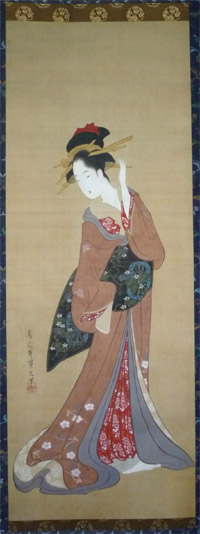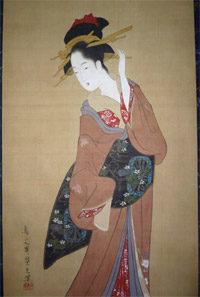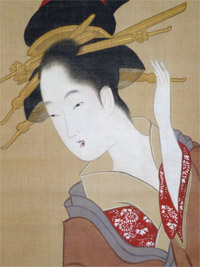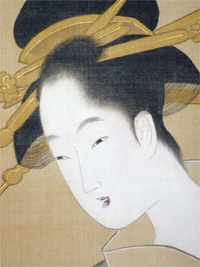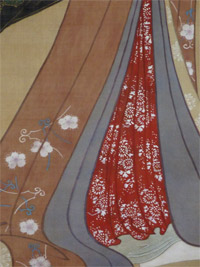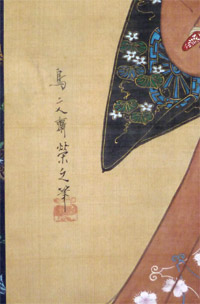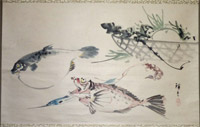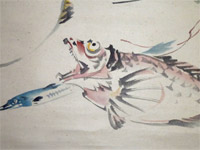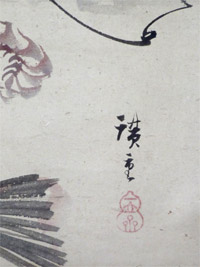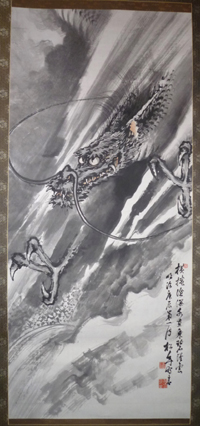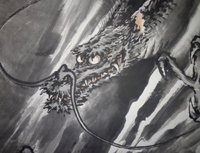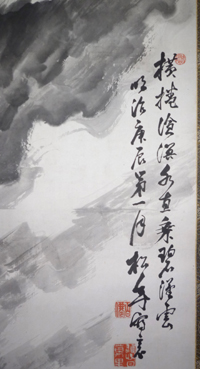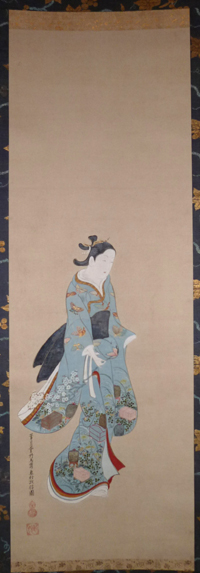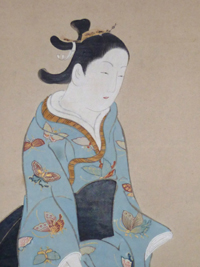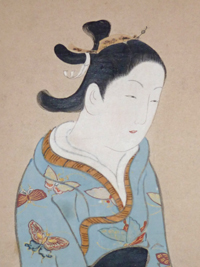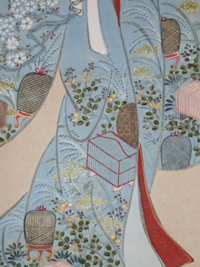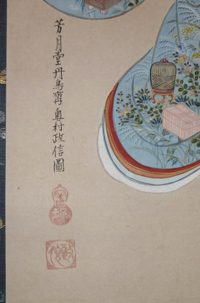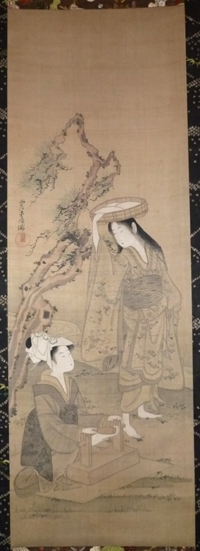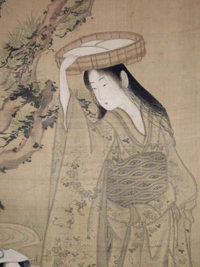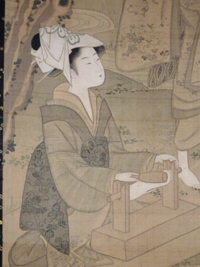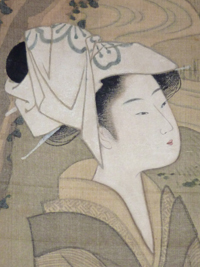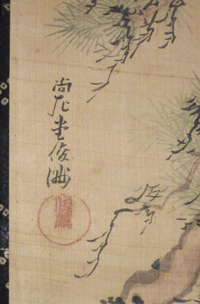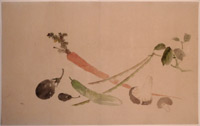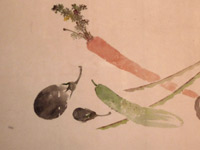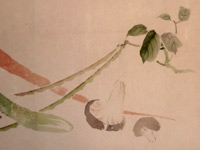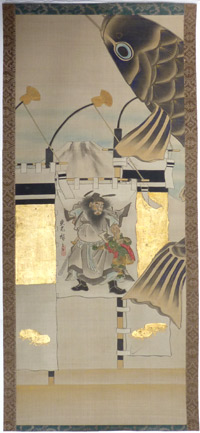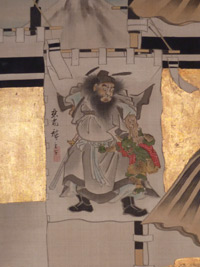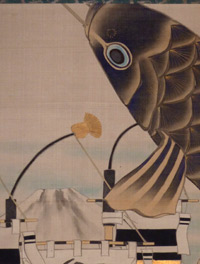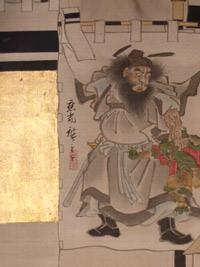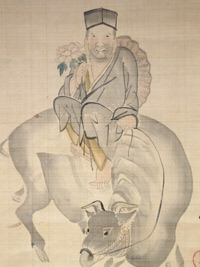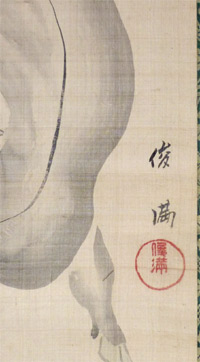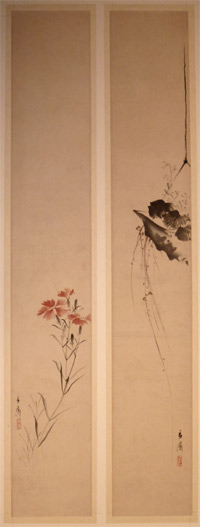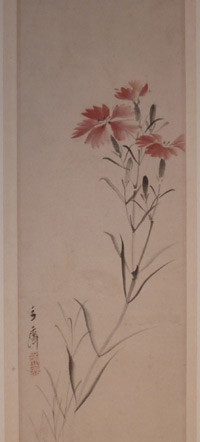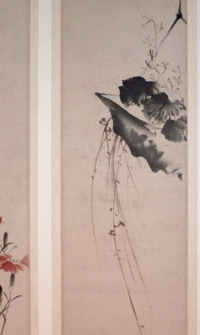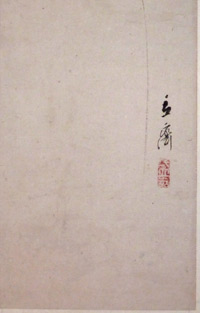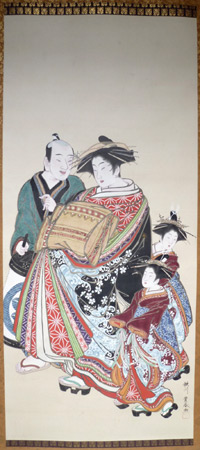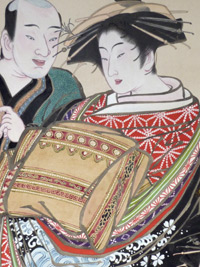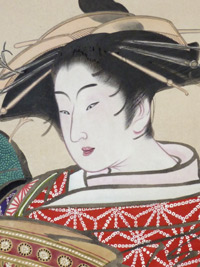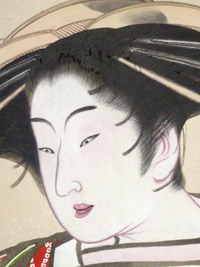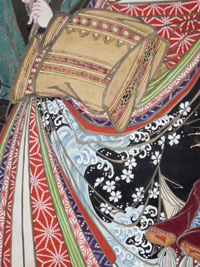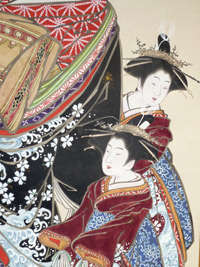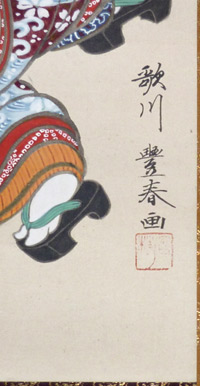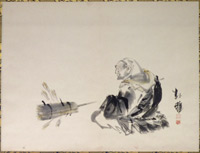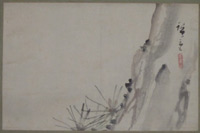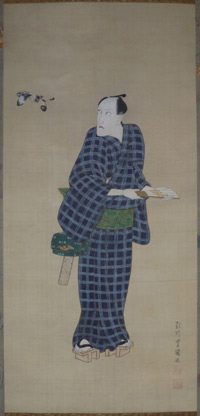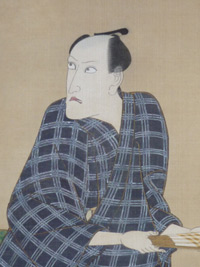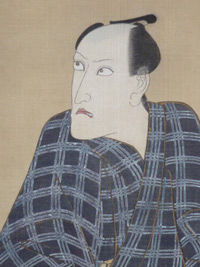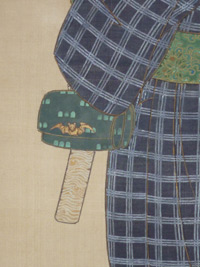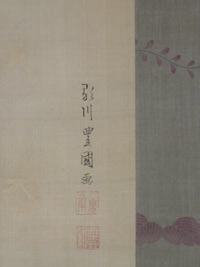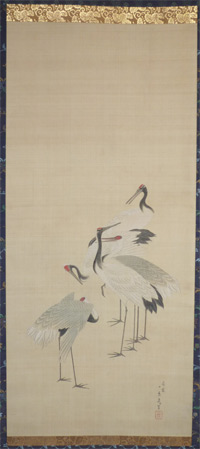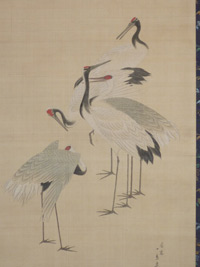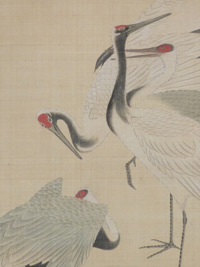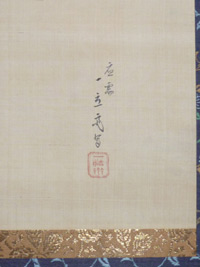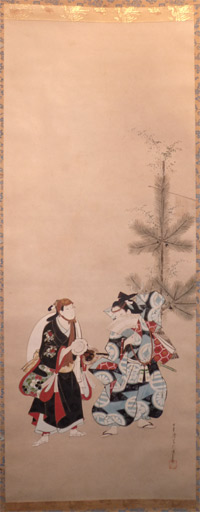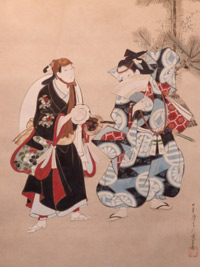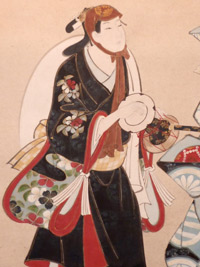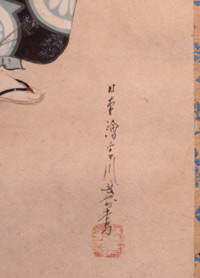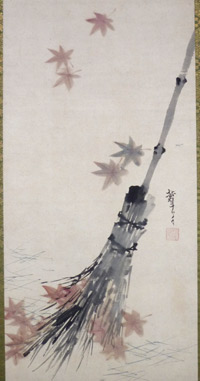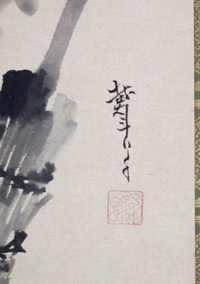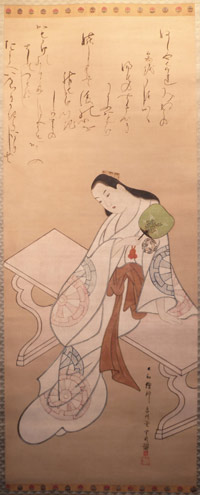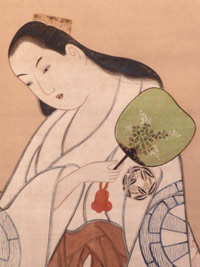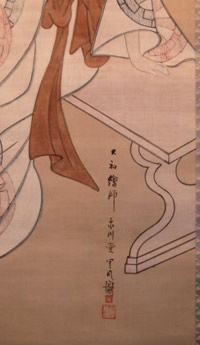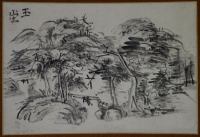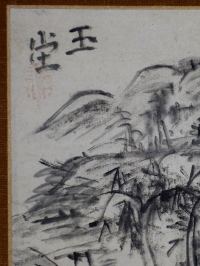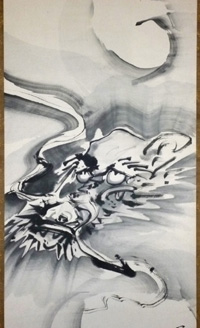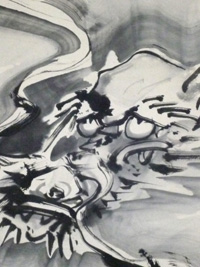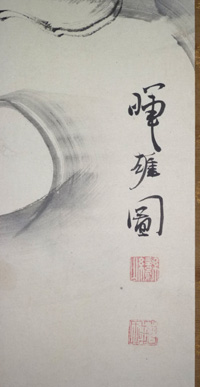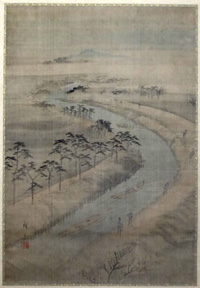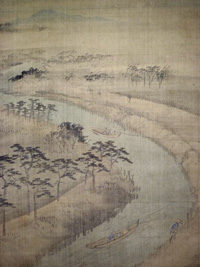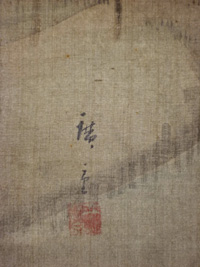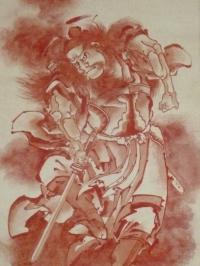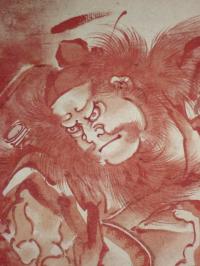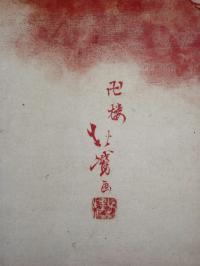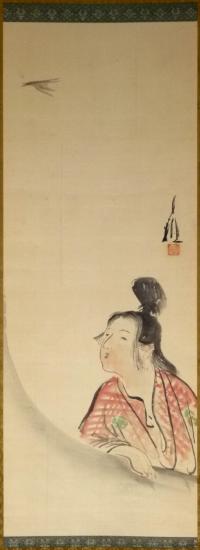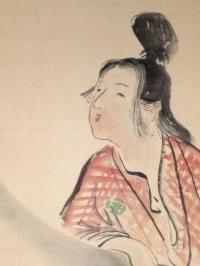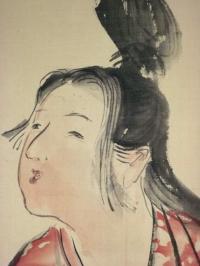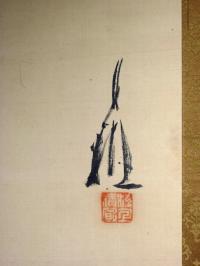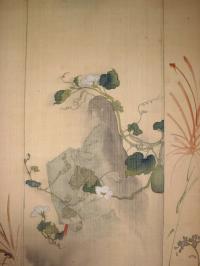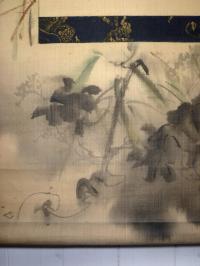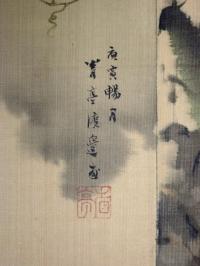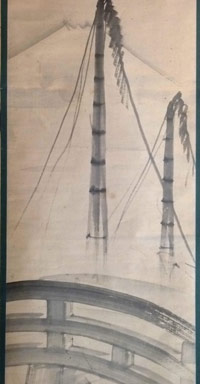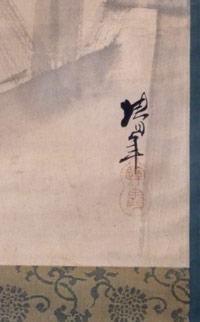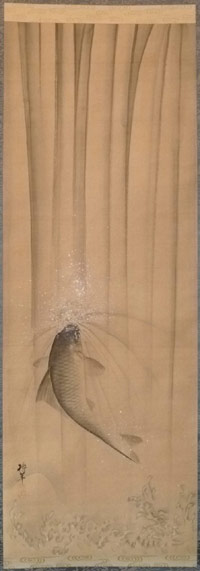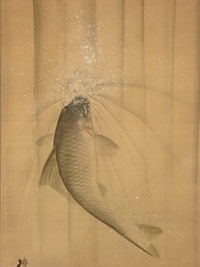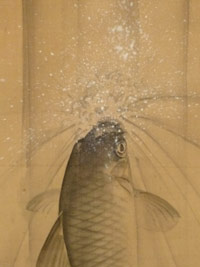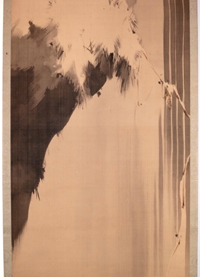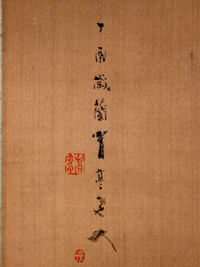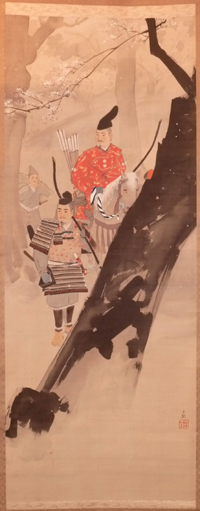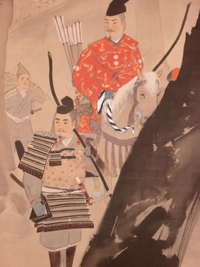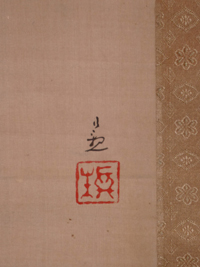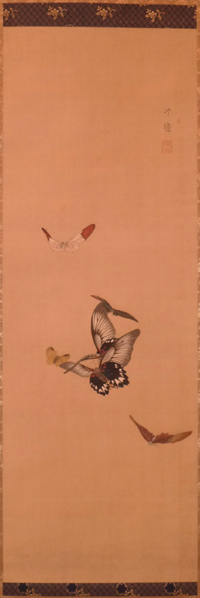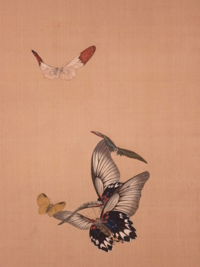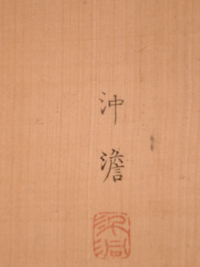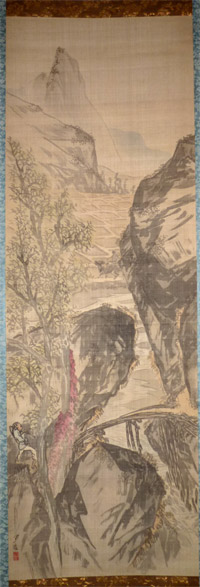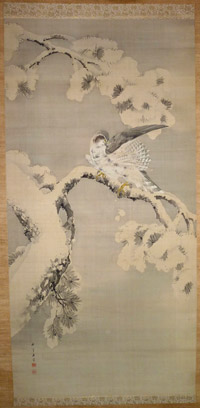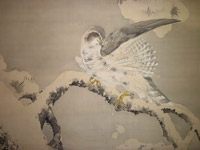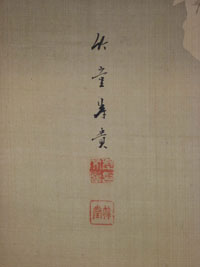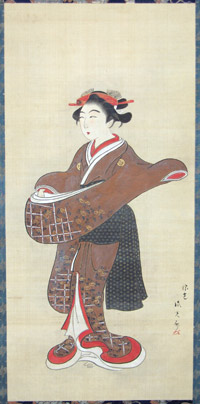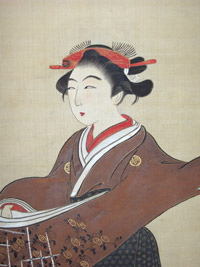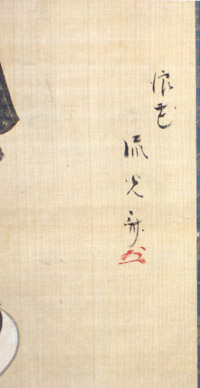Katsukawa SHUNCHO (Fl. c 1780-1801)
Click here to view image full size.
An original painting showing a standing beauty inserting a hairpin. An important print artist who produced many fine diptychs and triptychs. Paintings by him are rare. Studied under Shunsho, then Kiyonaga and Shumman. Full colour on silk, 30.75 x 10.5 in; 78 x 26.5 cms. Signed Shien Shuncho with unread seals.
Status: Sold
Katsushika HOKUGA (Fl. c 1820s to 1830)
Click here to view image full size.
A fine original painting showing a beauty on the snow-covered dock used by boats to the Yoshiwara. Hokuga was a pupil of Hokusai and produced paintings and surimono. Full colour on silk, 37.5 x 11.25 in; 92.75 x 28.5 cms. Two repaired wormholes, otherwise very good condition. Box with title “Beauty Standing on Dock” with painting guaranteed on the underside of lid by Narasaki Muneshige. Illustrated in Ukiyo-e Paintings in Japanese Collections, vol. 7: the Manno Art Museum, edited by Kobayashi Tadashi. The inscription above is by Ota Nampo – Shokusanjin ( 1749-1823 ). Signed Karyosai Hokuga fude.
Status: Sold
Gessai GABIMARU (Fl. c 1810)
Click here to view image full size.
A beautiful painting of a parading courtesan. A follower of Chobunsai Eishi in the Bunka period. There are works by him signed Chobunsai, so he may have been related to Eishi. Full colour on silk, 29.5 x 5.75 in; 75 x 14.5 cms. Painting in good condition. Mount is old and the painting should either be framed or remounted. Signed Gessai Gabimaru ga.
Status: Sold
Shiokawa BUNRIN et al
Click here to view image full size.
A fine Kyoto gassaku painting. ( A collaborative work by a group of friends. ) Shows a lobster by Shiokawa Bunrin ( 1808-1877 ), a pupil of Toyohiko; clams by Hasegawa Gyokuho ( 1822-1879 ) a pupil of Keibun; a sea bream by Yokoyama Seiki ( 1792-1864 ) a pupil of Keibun; and a stingray by Murase Soseki ( 1822-1877 ), a pupil of Keibun and Seiki. Four masters of the Shijo school. A large painting in full colour on silk in very good condition, 52.5 x 27.5 in; 133.5 x 70 cms. Mount in very good condition.
Status: Sold
Ichiryusai HIROSHIGE (1797-1858)
Click here to view image full size.
A large and important painting showing a view of the Sumida River through the piles of the Ryogoku Bridge. In the distance the ofunagura, “boat houses,” boats on the river and the Shogun’s official horses – goyouba – being taken out by samurai to the shoal outside the ofunagura-mae, the Shogun’s dock, to be cooled off. This masterpiece appears to be from a series of views of the Sumida as there is another – a view of Mimeguri, Sumida river bank in snow – in the Bato Hiroshige Museum of Art. The size, signature and seal is the same. Sumi and light colour on paper, 21.25 in; 54 cms. x 37 in; 94 cms. In very good condition. Old mount and box. Signed Hiroshige ga with Ichiryusai seal.
Status: Sold
Kono BAIREI (1844-1895)
Click here to view image full size.
A fine painter of kacho-ga and landscapes. Born and lived in Kyoto. Studied under Raisho and Bunrin. Especially well known for his teaching: In 1878 he began to work towards the establishment of an art school that opened in 1880 as the Kyoto Prefectural School of Painting. Contributed to numerous books from Bairei hyakucho gafu, 1881 to Bairei kacho gafu, 1881, Bairei hyakucho gafu zoku hen, 1884, Bairei gafu, 1886 et al. Shows a shoal of red sea bream, Pagrus major, and an octopus. Full colour on silk, 42.75 in; 108.5 cms. x 14 in; 35.5 cms. Probably original mount. Several small insect marks, otherwise very good condition. Signed Bairei with seals Naotoyo and Bairei.
Status: Sold
Taki KATEI (1830-1904)
A fine and decorative painted silk folding hand-fan by the Meiji artist Taki Katei. He lived in Tokyo and studied painting under Araki Kankai; also studied Chinese painting in Nagasaki. A fine kacho-ga painter. He contributed a lot to the medium of books and was the principle artist on three gafu: Kokotan gato, 1883; Kacho gafu, 1883 and Tanjo ippan, 1887. Shows a Japanese lobster, sea bream and shells with various flowers on one side and a hydrangea in a Chinese basket with various lilies on the other. The fan is in very good condition; the silk flecked with gold; the ribs are bamboo, the exterior decorated with floral designs in raised lacquer. The fan is contained within what is probably the original brocade case and has the original tassles. Fully open the fan measures 20.5 in; 52 cms. across and 11.25 in; 8.5 cms. in height. Fully signed and sealed on both sides Katei Taki.
Status: Sold
Katsushika HOKUSAI (1760-1849)
Click here to view image full size.
An important original painting showing a taro plant and balloon flowers. This statuesque plant is known as the village potato in Japan ( satoimo ) for its edible corms and “elephant ears” when grown ornamentally. Above is a poem by Ota Shokusanjin ( Ota Nampo ), a famous late Edo period poet and writer. The poem reads:
Aki chikoo saitsuru hanano koikaze ni
Kaburiwo fureru imoha arashina
Shokusanjin
Interestingly, Shokusanjin’s calligraphy is often at a slant. Why this should be I cannot say. The taro appears in other Hokusai paintings and there is another close version of this painting illustrated in the Special Exhibition, Hokusai, Nagoya City Museum, 1991.10.26 – 1991.11.24, no. 210. Hokusai often duplicated subjects as he was near to destitution many times. The painting employs the tarashi- komi – Rimpa technique of colours dripped or brushed into wet ink. Sumi and light colour on silk, 42.5 in; 108 cms x 11 in; 28 cms. Newly remounted and in fine condition with new box and futo-maki ( thick wooden roll to preserve the painting from damage ). Signed Iitsu hitsu with seal Iitsu. Sold together with what is probably the original box.
Status: Sold
Hosoda EISHI (1756-1829)
Click here to view image full size.
A fine original painting by one of the best known Ukiyo-e artists. This high ranking individual produced some of the most refined prints during the late 1780s and the 1790s. He had many pupils including Eisho, Eiri and Eisui. Shows a standing beauty painted c. late 1790s. One hand adjusts a hairpin, while the other holds a partly concealed letter. Image size 35.25 x 13 in; 89.5 x 33 cms. Exquisitely painted in full colour on silk. In very good condition with futo-maki ( thick wooden roll to preserve the painting from damage ) and fine new mount and box. Signed Chobunsai Eishi hitsu with Eishi seal.
Status: Sold
Ichiryusai HIROSHIGE II (1826-1869)
Click here to view image full size.
A free-style painting showing a basket with vegetables and a kasago, spotted rock fish or scorpion fish ( Sebasticus marmoratus ); a Japanese half-beak or snipe fish ( Hemirhamphus sayori ); shiba-ebi, shrimp, and a fugu or pufferfish ( Sphoeroides ). Hiroshige II ( Shigenobu ) was the adopted son of Hiroshige. On his death he married his daughter. Full colour on paper, image size 14 x 23 in ; 35.5 x 58.5 cms, c early1860s. Very good condition. Mounted and with box. Signed Hiroshige with Ichiryusai seal.
Status: Sold
Suzuki SHONEN (1849-1918)
Click here to view image full size.
A large painting for the year of the Dragon 1880 ( Meiji 13 ). Suzuki Shonen was a major Kyoto-based Nihonga artist of the late Meiji period. The son of Suzuki Hyakunen, the founder of the Suzuki school of painting, whom he succeeded. He seems to have been a somewhat flamboyant character and was known as the “modern Soga Shohaku.” Shows the Dragon of the Storm descending above turbulent water. A mythological creature that dominated Chinese and Japanese art. It was a scaly four-legged serpent with dorsal spines, the head having two horns, long feelers, and flame-like streamers at the shoulders and hind quarters. Painted in sumi with light touches of red on paper. Image size 56 x 25 in; 143 x 64 cms. Newly mounted. Very good condition. Signed Suzuki Shonen with date seal.
Status: Sold
Okumura MASANOBU (1686-1764)
Click here to view image full size.
A newly discovered painting by one of the most influential artist in Ukiyo-e. His long life covered hand-coloured prints through to full colour printing in the mid 1760s and he was one of the first to use the block-printing process after 1740 and pioneer the benizuri-e picture. Extremely innovative: he pioneered the uki-e print, pillar prints and ishizuri-e. Not only was he a print artist, he also illustrated books, albums and produced paintings. He started his own publishing house, Okumuraya, which gave him greater control over the printing process. The popularity of his work led to many copies by other publishers, and he had to certify his work as “genuine.” Shows a standing beauty, Tachi bijin-zu. She carries a cherry branch and her gorgeous costume is decorated with grasses and flowers with cages for collecting insects and above various colourful butterflies. Full colour on paper, image size 35.75 x 12.25 in; 91 x 31 cms. Fine new mount with futo-maki ( thick wooden roll to preserve the painting from damage ) and box. Fine condition. Ex collection Raizou Kanda. Signed Hogetsudo Tanchosai Okumura Masanobu with seals Masanobu and Okumura. Although long lived, genuine paintings by him are rare.
Status: Sold
Kubo SHUMMAN (1757-1820)
Click here to view image full size.
A fine painting showing a seated girl fulling cloth ( a process of beating which eliminated the dirt and other impurities ) with another standing beauty holding beaten cloth in a wooden tray on her head. This scene represents Mishima, or Toi, Province of Settsu. One of the Six Crystal ( Tama ) Rivers. ( Toi is the alternative name of the river and the word for beating cloth. ) This was probably Shumman’s most celebrated subject. He produced a set of six prints on this theme published by Fushimiya Zenroku, c 1787. One of the most beautiful 18th century sets, and together with a night triptych showing people returning from a poetry reading, is considered his masterpiece. The prints and the known paintings of this subject use the benigirai style, “red avoiding” pioneered by Shumman, Eishi and Shuncho. Shumman, a man of great sophistication, designed only a few prints before concentrating on surimono and printing and issuing some of the finest in this format. ( See The Japanese Print A New Approach, J. Hillier, pp. 102-104: “Probably no artist except Choki has achieved so high a reputation on such a small number of prints.” ) He also excelled at painting, book illustration and light verse. Painted on silk in tones of sumi, very light green, gofun and a small touch of red on the girls’ lips. Image size: 36 x 12 in; 91.5 x 30.5 cms. Other versions of this subject are in the BM ( 1922.2-13.01 ) and the Freer Gallery of Art ( FI903.62 ), gift of Charles Freer. Painted c early 1790s. Slight loss of gofun and very minor spotting, but otherwise in very good condition. Interesting old mount. Exhibited in 1995 at Shunsen Museum in Nanamashi prefecture, Nikushitsu ukiyoe meisaku ten, hosted by Mr Keizaburou Yamaguchi, p. 40, no, 37. Painting guaranteed by Mr Narazaki, the box being signed and dated 1988 by him. Signed Shosado Shumman, with circular Shumman seal.
Status: Sold
Katsushika HOKUSAI (1760-1849)
Click here to view image full size.
A wonderfully delicate study using light washes showing a Japanese carrot, mushrooms, a Japanese cucumber ( which have knobbles or spikes as opposed to our smooth-skinned varieties ), aubergines and long beans ( possibly yardlong beans ). Obviously from a large album of such studies ( it has a light centre fold ) which would have been signed and/or sealed at the end.
Full colour on paper. Fine condition. 11.5 x 18.5 in; 29.5 x 47 cms.
Status: Sold
Ichiryusai HIROSHIGE (1797-1858)
Click here to view image full size.
A fascinating specially commissioned painting by Hiroshige showing a large carp windsock ( koinoburi ) and Boys’ Day banners. Fuji is seen in the distance. The centre banner shows Shoki, the Demon Quellor, exorcising an oni. Shoki images were popular in houses to ward off evil during the Boys’ Day Festival, Tango no sekku, held on the 5th May. The carp was displayed outside homes of families with boys and their strength and character was symbolised by the determination of the carp swimming upstream. See also the print Suido-bashi, Surugadai from the Meisho Edo hyakkei, “One Hundred Famous Views of Edo,” published 1857 where Hiroshige uses the same large carp windsock. Sumi and full colour on silk. Extensive use of gold on the banners, the clouds below and the carp. The eye of the carp lacquered. 28.25 x 11.62 in x 72 x 29.5 cms. Original mount removed. The painting can either be framed and glazed or remounted. Very good condition. Signed Ojyu ( “commissioned” work ) Hiroshige fude. Seal Ichiryusai.
Status: Sold
Kubo SHUMMAN (1757-1820)
Click here to view image full size.
A fine painter and renowned for his surimono, and for supervising the design and carving of them for fellow poets. Produced some refined prints and contributed to kyoka anthologies. Changed the character with which he wrote “Shun” of Shunman from”Spring” to “Excel” in 1782. Shows a Botangesyohaku ( poet ) holding a peony and riding an ox. The kyoka poem above is by Ota Nampo ( 1749-1823 ), a leading light of popular literature who often collaborated with Shumman. Sumi and light colour on silk. 36 x 12 in; 91.5 x 30.5 cms. Old mount and box. In very good condition. Signed and sealed Shumman.
Status: Sold
Ichiryusai HIROSHIGE (1797-1858)
Click here to view image full size.
A pair of narrow paintings showing fringed pinks on one side and a hanging basket with ferns on the other. Sumi and colour on paper. 35.5 x 5.62 in; 90 x 14.2 cms each. Painted in semi-Shijo style. Fine condition. Framed and glazed. Signed Ryusai and sealed Ichiryusai on each.
Status: Sold
Utagawa TOYOHARU (1735-1814)
Click here to view image full size.
An extremely fine large painting by Toyoharu – the founder of the Utagawa School and teacher of Toyokuni and Toyohiro. Show a group comprising a high-ranking courtesan, her two kamuro ( attendants ), and her manservant carrying a lantern with either the crest of the Yoshiwara House or the crest of the courtesan. They are probably venturing out to meet wealthy customers in the teahouses of the Yoshiwara. The ample girth of the courtesan is typical of Toyoharu’s style at this time. Her surcoat ( uchikake ) is wonderfully decorated with breaking waves; the theme repeated on the coat of the front attendant. Little is known of his beginnings but it is thought he studied under the Kano-school master Tsuruzawa Tangei. He then went to Edo around 1763 where it is thought he was the pupil of Shigenaga and Sekien. Amongst his achievements was the development of the uki-e or perspective print. He gave up print design in the 1780s. Full colour on paper, 48.75 x 21.75 in; 124 x 55.5 cms. Fine new mount and double box. Perfect condition. Painted in his prime, c 1780. Although prolific ( something like 100 paintings are known by him ), this is probably the finest example extant.
Status: Sold
Katsushika HOKUGA (active 1804-1818)
Click here to view image full size.
A painting of a bamboo whisk seller. Hokuga was a pupil of Hokusai. A vigorous painting. Sumi and light colour on paper. 10.75 x 14 in; 27.5 x 35.5 cms. Nicely mounted and in fine condition. New box. Signed and sealed Hokuga.
Status: Sold
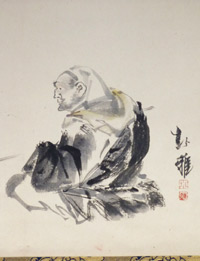
Click here to view image full size.
Utagawa HIROSHIGE (1797-1858)
Click here to view image full size.
A small drawing taken from an album of an old pine tree. Sumi and light colour on paper. Image size, 23.25 x 11 inches; 59 x 28 cms. Mounted as a painting. Very good condition. Signed Hiroshige.
Status: Sold
Utagawa TOYOKUNI I (1769-1825)
Click here to view image full size.
An important painting: Nanadaime Danjuro sugata-e, “Portrait of Danjuro VII.” Painted at the end of the Bunka period ( c. 1815 ), it shows the young Danjuro after his succession. He wears the Danjuro mimasugoshi, Danjuro’s triple-plaid kimono pattern. His favourite tobacco pouch with the bat-shaped catch is hanging at his waist. He is looking at two butterflies. An allusion to the famous story of Zhuang Zhou who dreams of being a butterfly, only to wake and wonder if he is, in fact, not a butterfly dreaming of being Zhuang Zhou. The story symbolizing the evanescence of life. A similar painting of Nakamura Utaemon II dated 1812 is in the Museum of Fine Arts, Boston, acc. No. 11.7864. Full colour on silk. Image size 23.25 x 11 inches; 59 x 28 cms. Two repaired wormholes not affecting image, otherwise very good condition. Interesting old embroidered and hand-painted mount. Signed Utagawa Toyokuni ga with seals Ichiyosai and Toyokuni.
Status: Sold
Utagawa HIROSHIGE (1797-1858)
Click here to view image full size.
A fine and rare painting: Gunkaku zu, “A Flock of Cranes.” Hiroshige designed many fine kachoga during the 1830s through to the 1850s but there exist few paintings. This was a commissioned work from Hiroshige. The tancho ( “red crest” ) Japanese Crane, Grus japonensis, is the second rarest crane in the world, migrating to East Asia in the fall to spend the winter. There is also a resident flock in Hokkaido. Much loved by the Japanese, the crane was a symbol of luck, longevity and fidelity. Full colour on silk, image size 34.5 x 15.75 inches; 88 x 40 cms. In perfect condition with a futo-maki ( thick wooden roll to preserve the painting from damage ). New box. Signed Ojyu ( “commissioned” work ) Ichiryusai hitsu. ( A rare form of the signature used c. Tenpo 10 to 11 [ around 1839 – 40 ]. ) The Ichiryusai seal is also a rare form used around mid Tenpo period.
Status: Sold
Miyagawa CHOSHUN (1682-1752)
Click here to view image full size.
The pre-eminent painter of the first half of the eighteenth century but not better known because neither he or his pupils are known to have designed any prints. His subjects were invariably beautiful girls and women, which makes this painting especially interesting. Shows two new year manzai dancers. These performers would go from house to house in the new year dancing, singing and engaging in knock about routines. The left figure sings and plays a small drum while his companion holds a fan and dances to the beat. Behind, a typical new year pine tree decoration. Full colour on paper, image size 38.25 x 15.25 in; 97 x 38.75 cms. The costumes are exquisitely detailed with outlines in gold. In very good condition with new mount, old lacquer jiku and old box. Signed Nihon-e Miyagawa Choshun hitsu and with blurred seal but reading Choshun no in. Kyoho – Kampo eras. One of the masterpieces of the British Museum’s Ukiyo-e painting collection is a pair of Choshun handscrolls.
Status: Sold
Katsushika HOKUSAI (1760-1849)
Click here to view image full size.
A newly discovered Hokusai painting showing falling maple leaves, pine needles and a rustic broom. Pine needles and a broom would suggest the Pine Trees of Takasago. Uba’s broom sweeping away evil – bringing good luck. But the painting suggests a Zen theme, the previous mount being in the Rinpo style for the Japanese tea ceremony. The painting is from his Taito period ( 1808 – 1820 ) when he was in his mid 50’s. Sumi and red on paper. Image size 11 x 39.5 in; 28 x 100.5 cms. In very good condition, remounted using fine Kano-style brocade and a futo-maki. New box. Signed Taito hitsu with Fumoto no sato seal, “Village at the foot of the mountain.” This seal is known to be associated with his Taito period and is on around six paintings. No Japanese artist was plagiarized to the extent that Hokusai was. Inumerable drawings, paintings and prints purporting to be by him are in circulation.
Status: Sold
Ichiyusai KUNIYOSHI (1797-1861)
Click here to view image full size.
A hand painted fan showing an Onna Daruma, a female Bodhidharma. Legend has it that Daruma reached Japan by crossing the sea on a stalk of millet and many prints depict this event but often substituting a courtesan for Daruma. Otherwise he is shown, bearded, with beetle brows and huge earrings. During the Edo period the word daruma was a slang expression for a prostitute and a darumaya was a brothel, hence the number of prints showing Daruma with courtesans. The fan has survived by being mounted onto Japanese paper. Sumi and red on a mica surface, 5.5 x 18.25 in; 14 x 46 cms. Signed Ichiyusai Kuniyoshi ga with kiri seal. Sold “as is” with all defects of a used fan. A rare item.
Status: Sold
Tosendo RIFU (Active c. 1730)
Click here to view image full size.
Rifu was a member of the Kaigetsudo school, although little is known of his life. This beautiful painting shows a young woman in a voluminous robe cooling off in the summer. Full colour on paper with elements picked out in gold such as the comb, fan and robe. Lacquered hair. Image size 46 x 18.75in; 117 x 47.5 cms. Two other Rifu paintings are in the Idemitsu collection, see Ukiyo-e Paintings in the Idemitsu Collection, 1988, no 50 and 51. In very good condition for a painting of this period on paper. Mount in excellent condition. New box and presented with a futo-maki ( thick wooden roll to preserve the painting from damage ). Fully signed Yamato e-shi Tosendo Rifu zu. Yamato meaning the pride of being a Japanese painter as opposed to one imitating Chinese painting.
Status: Sold
Uragami GYOKUDO (1745-1820)
An original painting, sumi on paper. Image: 5.5 x 8.25 in; 14 x 21 cms. Shows a hilly landscape with a coppice cut through with a stream and two bridges. Gyokudo is now considered the leading exponent of Nanga painting. An artist whose spontaneous paintings often appear as though executed under deep emotion or when partially intoxicated. Now greatly admired in Japan and the West with many fakes. His father was of samurai rank and Gyokudo initially served a nobleman, Ikeda Masake, in Bizen. However, his passion for music, painting and verse composition caused him to become a wanderer in 1794. His Bohemian life eventually leading him to Kyoto where he joined the literati circles of Mokubei and Chikuden. Most paintings done after 1794 and this example probably dates to around 1800 – 1810. Tastefully remounted with double box. Signed and faintly sealed Gyokudo. Rare.
Status: Sold
Soga SHOHAKU (1730-1781)
Click here to view image full size.
An enigmatic and unclassifiable artist who took the name Soga from Soga Jasoku, a fifteenth-century artist. He lived in Kyoto and is known to have abhored Okyo. Although admired for his dynamic brushwork by his contemporaries, he was considered – if not mad – certainly very eccentric. Now widely admired with many copies. Shows the Dragon of the Storm. A mythological creature that dominated Chinese and Japanese art. It was a scaly four legged serpent with dorsal spines, the head having two horns, long feelers, and flame-like streamers at the shoulders and hind quarters. What could be a hackneyed subject – especially in Kishi hands – but here transformed by the sheer brilliance of the brushwork. Sumi on paper, 47.5 x 14.5 in; 120.5 x 37 cms, c 1770s. Old mount with the painting in extremely good condition. Box of considerable age with inscription on lid: Soga Shohaku: Ranzan ka un ryu, “Soga Shohaku: Ranzan Dragon in the Cloud.” Underside of lid inscription states that it is from a collector’s rare collection and there are various undecipherable Japanese ( collectors’ ? ) seals. Signed Kiyu no zu with seals Ranzan and Soga shi. A masterpiece.
Status: Sold
Ichiryusai HIROSHIGE (1797-1858)
Click here to view image full size.
An important original painting either prior and for the published print Yotsugi-dori, yosui hikifune, “Hauling Canal Boats, Yotsugi Road” from the Meisho Edo hyakkei, published 1857; or painted at the same time because of particular satisfaction with the design. The canal supplied drinking water to the Fukagawa area. It also provided a regular passenger boat service heading northeast. There is some artistic license as the canal was fairly straight, which would not have provided such an interesting composition. Sumi and light blue on thin silk. ( Unique to Hiroshige as he had a penchant for rather coarse silk. ) 24.5 x 16.75 in; 62.25 x 42.5 cms. Good condition. From the collection of a leading supplier of tea ceremony utensils in Tokyo. Signed Hiroshige ga with Ichiryusai seal. ( For the same signature and seal, see Dr Timothy Clark, Ukiyo-e Paintings, B.M., no 141. )
Status: Sold
Manjiro HOKUGA (Fl. Early 19th Century)
Click here to view image full size.
A pupil of Hokusai who specialised in Surimono and book illustration. Used Hokuga signature until 1810, then Hotei Gosei. Shows Shoki, the demon quellor, descending to earth on a vapour cloud wielding a sword in order to vanquish demons. Painted entirely in red pigment. The subject matter and use of red ink comes from China. The colour was thought to exorcise evil spirits and was used to ward off illness. Red pigment on paper. Image size: 37.5 x 10.75 in; 95.5 x 27.5 cms. Very good condition. Old box. A fine painting exhibited and published: Itabashi Kuritsu Bijyutsukan, Hokusai and his followers – the collection of the best Ukiyo-e paintings. Exhibition Catalogue, Tokyo, 2008, pl. no. 57. Signed Manjiro Hokuga ga with seal Manjiro.
Status: Sold
Ogata GEKKO (1859-1920)
Click here to view image full size.
Gekko was a founding member of the Bunten and frequent prize winner. As well as designing prints, he illustrated magazines and decorated pottery. A talented artist who developed his own distinctive style. A young girl and a cuckoo. The first cuckoo traditionally heralds the arrival of summer and is usually shown flying across or near the moon – here represented by the circular window. And it might not be too fanciful to see the arrival of the cuckoo compared to the coming of age of the young girl. Sumi and colour on silk. Image size: 37 x 14 in; 94 x 35.5 cms. Very slight damage to bottom of washira mount. New box. Signed and sealed Gekko.
Status: Sold
Watanabe SEITEI (1851-1918)

Click here to view image full size.
A fascinating painting by Seitei in homage or as a commission inspired by Yoshitoshi’s ghost print: The ghost of Genji’s lover, Yugao, from Tsuki hyakushi, published 3/1886. Another unusual element is that Seitei has painted the outline of the scroll and the ichimonji and gone beyond, painting a surround of wild grasses and wispy clouds on what would be the kami and chu-mawashi. Seitei was famous for his depictions of birds and flowers and this is, again, a most unusual departure for him. One of Seitei’s masterpieces. Sumi and light colour on silk. Full size: 65.5 x 13.25 in; 166.5 x 33.5 cms. Light foxing at top, otherwise good condition with ( not original ) box. Signed Seitei Watanabe ga and dated kanoe Tora ( year of the Tiger, 1890 ) chugetsu, “Moon in Daylight.” Sealed Seitei.
Status: Sold
Onishi CHINNEN (1792-1851)
Click here to view image full size.
A highly talented artist, he is considered – with Nanrei – to be the finest exponent of the Maruyama-Shijo style in Edo at this time. Of samurai birth, he initially studied under Nangaku and is famous for the highly regarded books: Azuma no teburi, 1829 and Sonan gafu, 1834 ( offered elsewhere on this site ). Shows Fuji looming above masts and a bridge. Possibly the Inari Bridge near the harbour ( shrine ) at Teppozu in Edo. See Hiroshige’s design of this view for the 100 Views of Edo, no. 77. A typically spontaneous Shijo painting. Sumi on paper. Image size 41 x 10.5 in; 105 x 27 cms. Blue paper mounting; grey-blue damask ichimonji with bamboo rollers. Light creasing otherwise good condition with box. Signed Chinnen with seal Unka.
Status: Sold
Onishi CHINNEN (1792-1851)
Click here to view image full size.
A highly talented artist, he is considered – with Nanrei – to be the finest exponent of the Maruyama-Shijo style in Edo at this time. Of samurai birth, he initially studied under Nangaku and is famous for the highly regarded books: Azuma no teburi, 1829 and Sonan gafu, 1834 ( offered elsewhere on this site ). Shows a carp climbing a waterfall. A leaping carp is one of the commonest subjects for artists of various schools so as to become almost hackneyed. It takes an individual artist to breath life into the subject. Sumi and very light colour on silk. Image size 39.5 x 19 in; 99.5 x 35.5 cms. Blue-grey damask and beige silk mounting; cream gold damask ichimonji with bone jiku. New box. Light toning otherwise very good condition with splashed gofun around the head of the fish. Signed Chinnen with seal Unka.
Status: Sold
Watanabe SEITEI (1852-1918)
Click here to view image full size.
An original painting showing a snow covered cliff overhanging a waterfall; one long piece of vegetation is suspended over the fall. A beautiful painting in sumi with light touches of colour on silk. An artist who excelled at kachoga. Image size 39 x 13 in, 99 x 33 cms. Seitei was a successful artist and had a large studio. Many paintings of his are studio or partly studio works. Painting and original (?) mount in good condition. Ivory rollers and wooden box. Fully signed, sealed and dated: Hinoe tori ( 1896 ) doshi, Ran Seitei zu.
Status: Sold
Kobayashi KIYOCHIKA (1847-1915)
Click here to view image full size.
An original painting showing Minamoto Yoshiie, a renowned archer, at the Nakoso checking station ( Kikuta noseki ) on the boundary of the Hitachi and Iwaki Provinces in 1087. He is said to have halted his horse here and composed a waka poem on the cherry blossom covering the path. This well known painting was exhibited at a special exhibition at the Ota Memorial Art Museum in 1989 of Kiyochika’s work and illustrated in the catalogue, no. 193, p.11. Full colour on silk. Image size 50 x 19.5 in, 127 x 49.5 cms. Painting in good condition. Old mount slightly worn top and bottom, but generally good condition. Wooden rollers and box. Signed and sealed Kiyochika.
Status: Sold
Nakabayashi CHIKUTO (1776-1853)
Click here to view image full size.
A technically virtuoso painting of butterflies. Chikuto was recognized as the theorist of the Nanga school and is known for his illustrated books, especially Chikuto gafu of 1800. Full colour on silk. Image size 30.5 x 10.5 in, 77.5 x 26.5 cms. Painting and old mounting in good condition. Ivory rollers and wooden box. Signed and sealed Chikuto.
Status: Sold
Cho GESSHO (1772-1832)
Click here to view image full size.
An original painting showing an autumnal scene with a woodcutter carrying an axe and about to cross a bridge over a river that flows down from paddy fields with steep cliffs above. In the mid-distance a man on a bullock. Gessho was the son of a kakemono-mounter and, after studying with Goshun and Gessen in Kyoto, moved to Nagoya, where he stayed to become the leading artist with Baiitsu and Kinkoku. Well known for haiga and kyoka anthologies such as Fukei gaso and Zoku koya bunko. Sumi and colour on silk. Image size 38.25 x 13 in; 97 x 33 cms. Very good condition. Old mount and box with inscription Shusansui Gessho ga ifuku ( “one scroll” ). Signed Gessho with seals Yukisada ( Gyotei ).
Status: Sold
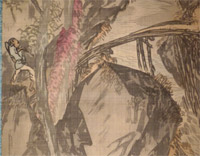
Click here to view image full size.
Kishi CHIKUDO (1826-1897)
Click here to view image full size.
A large painting, 57 x 28 in; 144 x 71 cms ( image size ) showing a peregrine falcon dislodging snow from a heavily snow-laden pine tree. The bird was closely associated with the New Year. Chikudo was the fourth generation head of the Kishi school which was founded by Ganku. An artist with great talent, he participated in the decoration of the Kyoto Imperial Palace in 1854. Signed Kishi Chikudo. Very good condition. Original mount and wooden rollers. Ink, colour and gofun on silk. With box.
Status: Sold
Jokei RYUKOSAI (Fl. 1772-1816)
Click here to view image full size.
The most important Osaka artist in the last quarter of the 18th century. His prints are rare and, apart from being an influence on Shunei and possibly Sharaku, he spawned a line of fine pupils. His actor prints are trenchant and full of character. A delightful painting showing a geisha parading and looking askance at a client ( ? ). Full colour on silk, 27 x 13 in., 68 x 32 cms. Good condition. Old mount. Lacquer ends. Signed Ryukosai with kakihan.
Status: Sold
